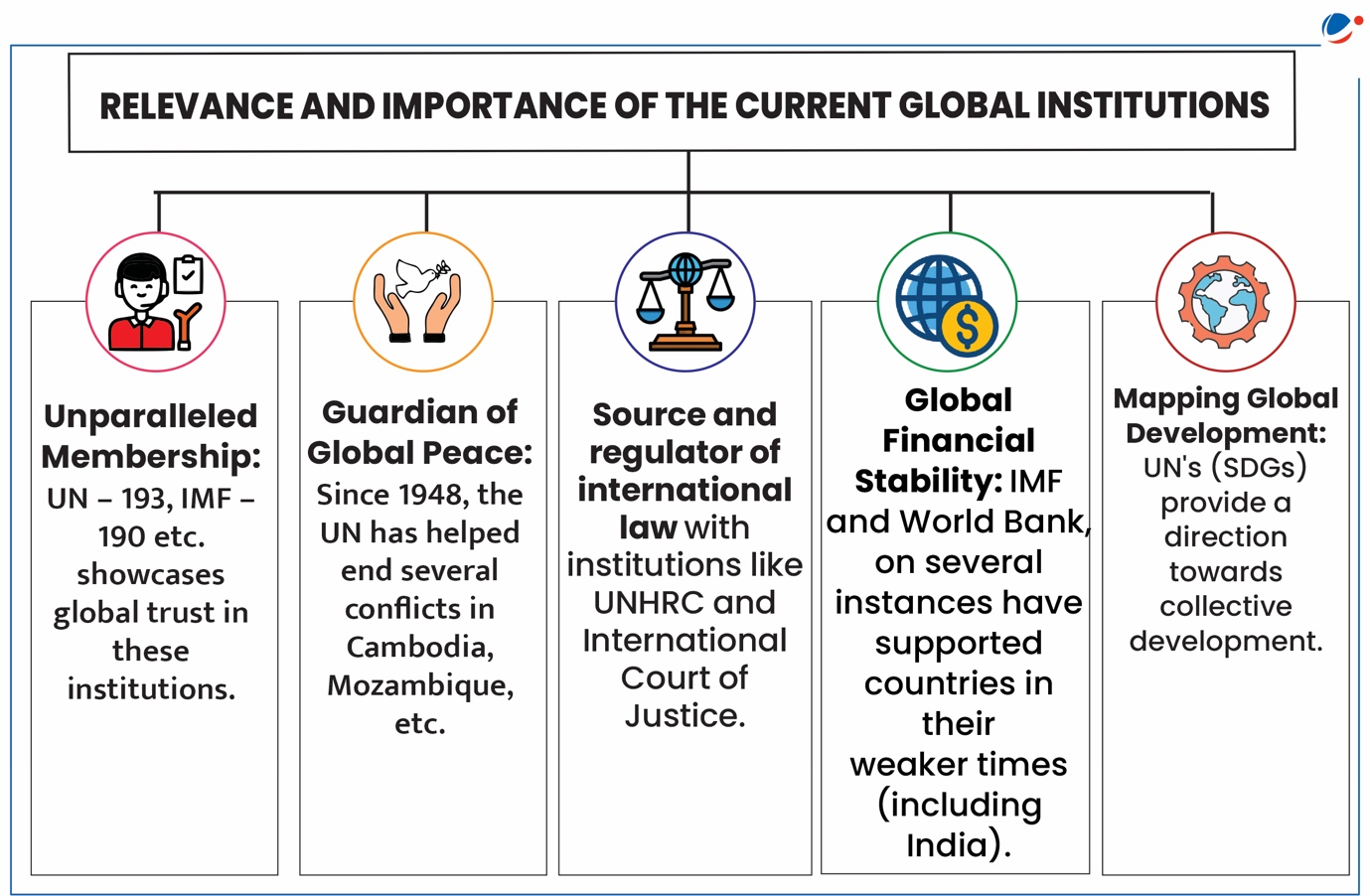Why in the news?
Major global institutions such as the UN System, WTO, IMF, and World Bank (WB) among others have been under scrutiny for not being able to fulfil their desired objectives.
Context of formation of major Global Institutions
Most of the major global institutions were formed in the context of a War-stricken, bipolar, and highly unequal world with regard to development.
- United Nations (UN) System: The UN was formed in 1945 in the background of World War I and II, with a primary agenda to prevent another global conflict and promote international cooperation.
- It aims to maintain international peace and security, give humanitarian assistance to those in need, protect human rights, and uphold international law.
- World Bank and International Monetary Fund (IMF): Both formed in 1944 at the Bretton Woods Conference, to support economic reconstruction and development in the aftermath of WW II.
- The WB promotes long-term economic development and poverty reduction.
- IMF aims to establish a new international monetary and financial system.
- World Trade Organization (WTO): WTO was formed in 1995 in the background of gradual liberalization of international trade and the transition from the General Agreement on Tariffs and Trade (GATT) framework.
- WTO aims to facilitate the liberalization of international trade by reducing tariffs, eliminating barriers, and promoting the free flow of goods, services, and investment.
What are the issues in continuing with current structures?
- Representation & Inclusiveness: Global institutions formed in the last century, don't reflect the current global power structure as they do not provide adequate representation to the developing countries.
- E.g., India with the largest population and 3rd largest (in PPP terms) economy in the world but has only 2.75% Special Drawing Rights (SDR) quota in the IMF.
- Growing Bilateral and Multilateral Groupings: Such as G20, G7, and BRICS, etc. have created alternative forums and thus decreased the overall importance and relevance of global institutions.
- E.g., BRICS countries established the New Development Bank (NDB), as an alternative to World Bank in funding developmental needs.
- Misuse of Veto Power: Veto powers conferred to permanent UNSC members (China, France, Russia, U.K. and U.S.) are often misused to protect self-interest.
- E.g., Russia used its veto power to block resolutions condemning its actions in Ukraine.
- Rising Protectionism and Trade Tensions: The surge in protectionist policies, such as tariffs and trade barriers (like Trade Wars between US and China), has disrupted the global trade system and multilateral frameworks like the World Trade Organization (WTO).
- It threatens the principles of free trade and economic integration that have underpinned the post-World War II economic order.
- The U.S. also blocked the appointment of WTO's Appellate Body, effectively crippling WTO's role as an impartial arbiter of trade disputes.
- Inability to handle emerging challenges: Global institutions created in the last century are not able to effectively address the issues of 21st century such as climate change, cyber-security, data protection etc.
- The COVID-19 pandemic underscored the failure of the UN and WHO to bring countries together to respond effectively in times of crisis
- Backlash Against Globalization: There has been growing public discontent and political backlash against globalization in many countries.
- It is being fueled by concerns over job losses, income inequality, which has led to calls for more inward-looking economic policies.

Way Forward
- Governance Overhaul: Bodies like the UN Security Council must be reconstituted to give greater representation and voice to emerging powers. E.g., expanding the permanent membership.
- Financing Revamp: Financing should be diversified including tapping private capital and emerging donors, moving away from the dominance of a handful of wealthy nations.
- Strengthening Enforcement: Rules and commitments negotiated through global institutions need teeth in the form of stronger enforcement and dispute resolution mechanisms. E.g., empowering institutions like UNCLOS (United Nations Convention on the Law of the Sea).
- Embracing Technology: From monitoring climate change to verifying disarmament or human rights, institutions must better leverage technologies like AI, satellite monitoring, and digital data collection.
- For instance, the Secretary-General has called for UN 2.0 to tackle 21st-century challenges. UN 2.0 would emphasize 5 areas - data, digital solutions, innovation, foresight, and behavioral science.
- Strengthen the global financial system through robust regulation, supervision, and risk management frameworks to prevent systemic crises.
- Diversifying Funding Sources: Exploring innovative financing mechanisms, such as voluntary contributions, international taxes, or public-private partnerships.
Conclusion
The choices made in the coming years will determine whether these bodies can rise to meet the challenges or diminish into insignificance.



